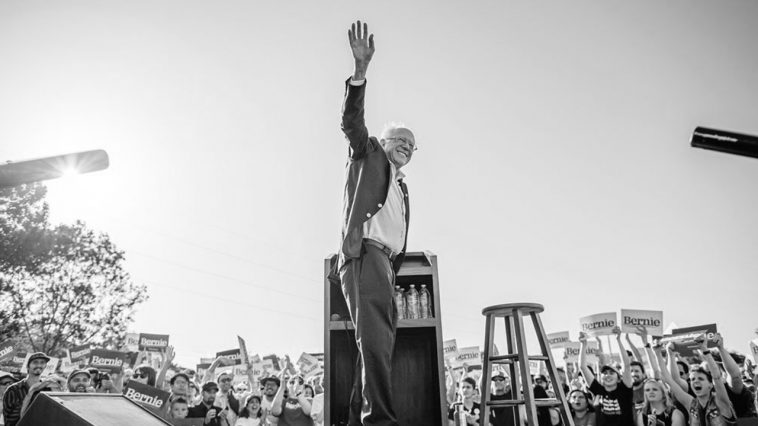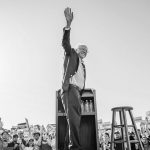Bernie Sanders can win the Democratic Nomination for President of the United States.
Many mainstream media news articles ignore Senator Sanders while numerous others state that he is unelectable. Wins in early states are likely to provide boosts in support as voters recognize Senator Sanders electability. Bernie Sanders remains unknown to minority voters, due to lack of media coverage, which will change with early state wins. As a reminder, Barack Obama trailed Hillary Clinton by similar margins prior to 2008 primaries. No measure of significance has been given to the intense and energetic support of Bernie Sanders’ followers. Even with early wins, Senator Sanders’ grassroots activists will have to work hard to phone bank and canvass on behalf of their candidate to overcome clear advantages of the Establishment campaign of Hillary Clinton. With determination from his supporters, Bernie Sanders can win the Democratic nomination.
Wins in the early states of New Hampshire and Iowa are extremely likely to provide boosts in support as voters recognize Senator Sanders electability. According a study conducted by William G. Mayer, “a win in New Hampshire increases a candidate’s share of the final primary count in all states by 27 percentage points.” Likewise, as a result of Barack Obama’s win in the 2008 Iowa Caucus, he received a significant surge of support in the New Hampshire primary. In the November 20, 2015, NBC poll, Bernie Sanders trailed Hillary Clinton by only 16 points among likely Democratic voters who had participated in the last two elections. According to history, “the upset by a runner-up changes the calculus of national politics in a matter of hours.” Once Senator Sanders wins an election, the polling numbers will change drastically very quickly. Throughout September, Bernie Sanders gained a strong lead in the New Hampshire polls. In the CBS poll of November 23rd, Senator Sanders maintained a lead of 7 percentage points over Hillary Clinton. With a renewed effort in the Granite State, Bernie Sanders could anchor a successful campaign on a win in the New Hampshire primary.
Bernie Sanders remains relatively unknown to many potential non-white Democratic voters. In the June 2015, NBC poll, which had Hillary Clinton winning 75 to 15, only 51% of those polled had enough information to provide an answer. Forty-nine percent of all Americans in this poll, had not heard of Bernie Sanders. This is unsurprising, as Bernie Sanders was given only 24 minutes of Network news air time up to October 6, 2015. Despite the near blackout from ABC, NBC, CBS news, in the 6 months since June, Bernie Sanders has closed the national gap by half. According to the latest ABC poll, in the last month alone, Bernie Sanders has doubled his following among minorities. However, Bernie Sanders still trails Hillary Clinton among minority voters, especially black voters, by large margins. Once Bernie Sanders wins the New Hampshire primary, the mainstream media would be forced to provide the candidate coverage and the minority voters will be given more exposure to the candidate. However, informing the minority communities in Nevada and South Carolina is of particular importance since they hold their caucus and primary in February.
Historically, the 2008 Democratic Primary campaign nearly mirrors the current 2016 campaign. In 2008, Hillary Clinton was also the presumptive nominee expected to be coronated before a single vote was cast. There were two challengers, Senator John Edwards from South Carolina and a virtually unknown Senator from Illinois, Barack Obama. In the pre-primary polls, Hillary Clinton led Barack Obama by 20 percentage points. Today, Clinton leads Sanders by 25 points. As mentioned earlier, a win in New Hampshire could erase that lead virtually overnight.
More importantly, no measure of significance has been given to the intense and energetic following of support on the social media platforms of Facebook, Twitter, Reddit and the candidate’s official website. Most political pundits waive off the phenomenon because of its immeasurability. Despite more than 20 years of development, the political establishment still cannot accurately predict voting behavior based upon Internet behavior. This is the political punditry’s fatal flaw in dismissing Senator Bernie Sanders. These followers are active grassroots volunteers for his campaign.
On November 22, Hillary Clinton had 1.8 million Facebook followers compared to Bernie Sanders 2.4 million followers. “Sanders followers liked, shared or commented on his status updates six times more frequently than Clinton followers.” In addition to the official Bernie Sanders Facebook page, there is at least one grassroots group for each state, several groups dedicated to specific cities and numerous pages and groups dedicated to specific demographics and interests. During the month of September, “95% of Sanders’ (Facebook) growth came from within the United States, while for Clinton that number is only 74%.” On Facebook, Bernie Sanders has the clear advantage.
On Twitter, Hillary Clinton claims 4.7 million followers to Bernie Sanders 1 million. However, according to the website TwitterAudit.com, 41% of Hillary Clinton’s followers are fake accounts compared to only 10% of Sanders’ followers. Moreover, Bernie Sanders’ followers are more than twice as likely to like a tweet despite being outnumbered nearly 5 to 1. This shows how that despite the large discrepancy between their followers, Bernie Sanders’ followers are clearly more engaged on a regular basis.
On reddit, known as the front page of the Internet, Bernie Sanders has a loyal following of 134,400 compared to only 1,095 for Hillary Clinton. It is this digital army that has led the charge for Senator Sanders through the early months of the campaign.
Another indicator of interest can be found comparing the candidates’ official websites. Web traffic towww.berniesanders.com is twice as high to his rival www.hillaryclinton.com. Bernie Sanders receives nearly 89,000 unique visitors to his website per day which equates to approx. 2,664,810 per month. Hillary, on the other hand, attracts less than 44,091 unique visitors a day and 1,322,730 visits a month. Based upon these numbers, people are showing twice as much interest in Bernie Sanders than in Hillary Clinton.
To win, Senator Bernie Sanders requires his grassroots activists to register new voters, educate already registered voters and bring both new and old voters to the primary or caucus on election day. With less than 70 days remaining before the first caucus, he needs his supporters to volunteer to phone bank, canvass door to door, set up tables at local events to inform voters about their candidate and his issues. Most importantly, they must reach out to the African American and Latino communities to inform them that Bernie Sanders represents their interests.
For all of the above reasons, Bernie Sanders can and is likely to be the Democratic Nominee for President of the United States in 2016.


